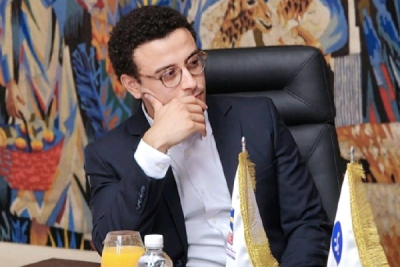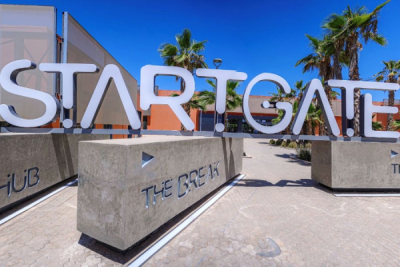Africa is a continent with immense potential for innovation and entrepreneurship, but it also faces many challenges. DFC Technology Hub is doing its part to address some of those challenges and foster a dynamic technology ecosystem.
DFC Technology Hub (DTH) was founded in 2021 by Felix Achibiri. It is a technology accelerator, startup incubator, and venture capital firm with a strategic initiative to accelerate the pace of technological development in Africa.
DTH works closely with founders and innovators to create technology solutions that will shape Africa's future, particularly in the fields of fintech, logistics, e-learning, and e-government. The platform it offers Africans is a valuable means of accessing a comprehensive range of resources essential to the growth of their technology businesses. These resources include financing, mentoring, training, technical support, a solid business network, and the opportunity to access global markets.
The accelerator also offers various programs tailored to different phases of the innovation process, from initial conception to product scale-up. For instance, its African Founders Accelerator program targets startups that have already validated their product on the market and are ready to expand their activities in Africa and beyond. It offers beneficiary startups financial support, mentoring, and privileged access to DTH's network of partners and investors.
For engineers and researchers working on cutting-edge technologies that can solve Africa's challenges, DTH offers the Makers & Builders Program. This program provides technical support, prototyping facilities, and access to the DTH research laboratory.
Finally, the Thinkers and Innovators Programme is aimed at entrepreneurs with disruptive ideas likely to shape Africa's future. It supports them in validating their concepts, developing prototypes, and launching minimum viable products.
To date, DTH has incubated 11 start-ups, contributing to the creation of over 751 direct jobs across Africa. Its ambitious goal is to support more than 250 startups in Africa over the next decade.
Melchior Koba
In addition to strengthening its presence in the region, the investment will enable the Nigerian company to provide secure and transparent payment services to consumers and businesses in Kenya.
Nigerian payment solutions provider Flutterwave recently announced plans to invest $50 million in Kenya. Olugbenga Agboola (photo, center), CEO and co-founder of Flutterwave revealed this during a media interview in the country's capital, Nairobi.
According to the CEO, the investment will be deployed as soon as the company receives regulatory approval from the Central Bank of Kenya (CBK).
"We are very optimistic about Kenya and once we get the license, our team in the country is ready to deploy the very next day. [...] We are happy we are going through the process of approval. We didn’t chicken out. We stayed the course even when everything stopped. The current administration is very supportive," he said.
Flutterwave's announcement comes a week after the company signed a partnership agreement with Indian financial institution IndusInd Bank to expand its services to India.
As far as Kenya is concerned, Flutterwave announced last April that it would be setting up its main operating station in Nairobi, for the East African market. This investment will be used to hire staff and develop Flutterwave's infrastructure in Kenya. Olugbenga Agboola also noted that the company already has more than two dozen employees in Kenya.
Founded in 2016 by Nigerians Olugbenga Agboola and Iyinoluwa Aboyeji, Flutterwave is now present in some 30 African countries. The Lagos and San Francisco-based startup is valued at around $3 billion.
Samira Njoya
With an Internet penetration rate of 33.63% in 2021, Liberia is gearing up to accelerate its digital transformation. To achieve this, the country needs strong allies it can count on.
At a workshop held on Tuesday, September 12 under the theme "Building a Digital Liberia- Bridging Vision and Transformation for Unleashing Future Development," the World Bank announced that it will support Liberia's digitization efforts to drive meaningful growth and development.
The UN organization will harness the power of technology to drive innovation, improve governance, and create economic opportunities for all Liberians, says Georgia Wallen, World Bank Country Director for Liberia.
"We’ll assess Liberia’s digital transformation journey and also look ahead — what can Liberia’s digital transformation economy look like in the future? [...] So, this is not only about adopting technology that is sustainable and benefits all but rather creating an entirely digital environment that is inclusive," she added.
The country is lagging in the digital transformation process compared to other African countries. However, it intends to catch up in this sector. According to data from the International Telecommunication Union, the country's Internet penetration rate is steadily rising. From 18.9% in 2018, it reached 33.63% in 2021.
For Worlea Saywah Dunah, Liberia's Minister of Posts and Telecommunications, the workshop is in line with the government’s strategy to transform the Liberian economy and enhance social development.
Social and economic development are the visions “ we aspired to as a nation in developing a vibrant ICT sector and this vision is captured in the President’s flagship agenda, which is called the PAPD. We are beginning to work with stakeholders in the sector and development partners to develop a 5-year national digital transformational agenda that will meet the best ICT standards through which we can achieve social and economic development as enshrined in the PAPD,” he said
Adoni Conrad Quenum
With his fintech startup Kaoun, the entrepreneur facilitates and secures access to financial services for all Tunisians. His company's flagship product, Flouci, has won him several international awards and distinctions.
Nebras Jemel (photo) is a young Tunisian entrepreneur. In 2017, together with Anis Kallel and Rostom Bouazizi, he founded Kaoun, a fintech company that aims to improve financial inclusion.
To reform the financial system, Kaoun helps companies understand and monetize their data for better service and increased profitability. It assists governments in the development of comprehensive financial programs and supports the digitization of public administration.
In line with its mission, the company has developed a remote identification (E-KYC) solution to enable strong remote authentication of individuals during bank account opening or before making online payments. It has also developed electronic signature products to enable individuals and companies to sign documents remotely. These products are also used to securely store signed documents and share information quickly and efficiently.
The company's first product was Flouci, a financial app that offers fully digital access to free bank accounts, wallets for payments and transfers, and other financial services for the unbanked and underserved. In the 48 hours following the launch of Flouci, the app was downloaded 9,000 times and received 700 account opening requests.
Flouci aims "to become the standard app for financial inclusion in Tunisia. The Chinese model speaks for itself. The Alipay and WeChat Pay platforms are widely used, despite the widespread use of bank cards,” explained Nebras Jemel in 2020. In 2014, the latter was a summer researcher at the Fondazione Bruno Kessler, a European research institute focused on artificial intelligence. From 2015 to 2016, he worked as a research assistant at Harvard University's Center for Middle East Studies. Between June and July 2016, he worked for Legalist Inc., an institutional alternative asset management company, as a software engineer, participating in the development of a legal data platform for the company.
Nebras Jemel and his company have won several awards. In 2020, Kaoun became the first Tunisian startup to graduate from the Google for Startups Accelerator program. It also won the AfricaTech Awards in the fintech category at the VivaTech 2023 conference in Paris.
Melchior Koba
The adoption of technology across the continent presents numerous opportunities. Yet, realizing these opportunities hinges on equipping young people with digital skills. Many governments are creating opportunities to train their youth in this sector for development.
Kenya's ICT Authority has launched a program to promote digital skills among underrepresented groups. The program was announced in a tweet by the ICT Authority on September 12.
The initiative, the Presidential Digital Talent Program (PDTP), aims to equip 400 young Kenyans, including women, persons with disabilities, and those in Arid and Semi-Arid Lands (ASAL), with essential ICT skills.
The PDTP offers comprehensive training in network and infrastructure, software development, artificial intelligence (AI), graphic design, digital marketing, and data analysis.
The goal is to empower marginalized groups with digital skills for employment and entrepreneurship. By targeting ASAL regions, the program seeks to bridge the digital divide and ensure remote communities benefit from ICT.
Stanley Kamanguya, CEO of the ICT Authority, stressed the government's commitment to developing a skilled ICT workforce through PDTP. Digital skills play a vital role in leveraging technology across all sectors of the economy.
PDTP's comprehensive training is expected to boost Kenya's economy by diversifying the workforce. This will enable both the government and the private sector to tap into a talent pool driving innovation.
The program, set to run for 12 months, will provide participants with the expertise to thrive in the digital age. Kenya aims to become a regional hub for digital talent and innovation, fostering economic growth and inclusivity.
Kenyan nationals can apply at digitalent.go.ke until October 3, 2023.
Hikmatu Bilali
By providing valuable resources and fostering a supportive community, StartGate is helping to propel African startups onto the world stage.
StartGate is an innovation campus founded in 2020. Affiliated with the Mohammed VI Polytechnic University, it offers world-class infrastructure and resources to support entrepreneurs as they launch and develop their startups.
Its services include mentoring, business development support, and access to finance. It provides entrepreneurs with technological equipment and modern, open workspaces to stimulate their creativity.
The campus is home to several partner programs designed to help entrepreneurs at various stages of their journey. It includes Explorer, an innovation program offering entrepreneurial training, mentoring, and potential funding opportunities. Another program it offers is Entrepreneur Academy, which targets university and high school students, researchers, employees, and all types of aspiring African entrepreneurs, providing them with an introduction to and training in entrepreneurship.
There is also U-Founders, which deploys incubation, pre-incubation, and entrepreneurship awareness programs for students, researchers, and entrepreneurs belonging to the university's ecosystem.
Other notable programs include the African Youth Climate Hub, which provides resources and tools for young African climate entrepreneurs, and the Moroccan Retail Tech Builder, the first Venture Builder in Morocco –and Africa as a whole– dedicated to the digitization of the retail sector.
With Sarrah Chérif d'Ouezzan at the helm, StartGate has, since its creation, supported more than 624 entrepreneurs and start-ups from over 15 African countries. It has organized over 100 workshops and training sessions in 20 business sectors.
The campus hosts more than 10 support programs for the launch and development of startups. It has a network of 200 Moroccan and international mentors and experts and over 30 investors.
Melchior Koba
Alpha Direct was founded in 2014 but, it came into the spotlight in 2021 when it announced record sales of around $4.8 million during the previous financial year.
Founded in 2014 by Arun Iyer (photo), Alpha Direct is a Botswanan startup operating in insurance technologies. Headquartered in Gaborone, the capital of Botswana, it announced the completion of a $600,000 funding round, in 2021, to accelerate its growth.
The startup has developed an eponymous insurtech solution to enable users to purchase various insurance policies right from their smartphones. The solution is accessible through an Android app or a web platform. Through those mediums, a user can create an account and choose the insurance policy that best suits his or her needs (from car insurance to travel insurance) and get a quote. Once the quote is obtained, the user can subscribe to the chosen policies if he/she agrees with the conditions.
Apart from subscribing to policies, through the Android and web platforms, a user can also submit claims. All that is needed is to fill out a form providing all the relevant information to ensure rapid processing.
Since its launch, the mobile application has been downloaded over a thousand times. The startup plans to conquer other regions in Botswana and enter the Zambian and South African markets.
Adoni Conrad Quenum
As the world continues to see advancements in the use of digital tools for development and growth, African countries are not left behind. Many African governments aim to leverage collaborations with other countries to fast-track their adoption of technology, and development subsequently.
Yesterday September 13, 2023, India’s Union Cabinet approved a Memorandum of Understanding (MoU) the country signed with Sierra Leone to advance digital transformation initiatives and bilateral cooperation.
Signed on June 12, 2023, the memorandum will see a collaboration between India's Ministry of Electronics and Information Technology and Sierra Leone's Ministry of Information and Communications. It focuses on sharing successful Digital Solutions implemented at a population scale.
Key objectives of the MoU include promoting closer cooperation, exchanging experiences, and sharing digital technology-based solutions to drive digital transformation in both countries. The partnership is also expected to create employment opportunities in the IT sector.
Effective from the date of signature, the MoU will remain in force for three years. It aims to enhance cooperation in both Government-to-Government (G2G) and Business-to-Business (B2B) domains, particularly in Digital Public Infrastructure (DPI).
The MoU signing marks a significant step toward digital empowerment and cooperation between India and Sierra Leone, promising positive transformation in both nations' digital landscapes. Activities implemented under its framework will be funded by regular operating allocations from both administrations, underscoring their commitment to the collaboration.
Hikmatu Bilali
Tanzania aims to become one of the leaders in the digital sector in Africa. To achieve this goal, the executive is focused on building a strong digital infrastructure.
The Tanzanian government is currently working on the implementation of several citizen-centric digital infrastructures, including the construction of a National Enterprise Services Bus (NESB), a GovTech Innovation Center, and a National Services Directory.
The projects were announced by the Minister of Information, Communication, and Information Technology, Nape Nnauye (photo), at the end of the "Connect-to-Connect 2023" summit held from Saturday, September 9 to Sunday, September 10 in Zanzibar.
In his concluding address, the Minister specified that the National Enterprise Services Bus will facilitate the transparent sharing of data between public and private sector companies. The creation of the GovTech Innovation Centre and the Tanzanian Services Directory is a crucial step in improving the dissemination of information services for government and private entities.
The said initiatives are part of the "Revised National ICT Policy 2023", which aims to create a sound policy environment to narrow the smart device penetration gap in the country and drive digital transformation.
The revised policy “seeks to strengthen the research and innovation ecosystem, encouraging individuals and innovators to generate creative solutions for addressing pressing social issues and also prioritizes cyber security and the development of future-ready ICT human resources in the country,” explained Minister Nape Nnauye.
Tanzania recently multiplied partnerships with other countries and international companies to accelerate the digital transformation of its economy. The government also announced several investments in the Zanzibar Archipelago aimed at making the island a technological innovation hub par excellence in Africa.
According to the Minister of ICT, these initiatives have enabled Tanzania to rank among the top digital performers in Africa. Among other things, the country ranks 23rd worldwide on the World Bank's GovTech 2022 Maturity Index (GTMI).
Samira Njoya
Apart from science and technology, engineering is one of the most important sectors of the Nigerian economy. It is therefore important for professionals in the sector to digitize their activities to capitalize on the digital opportunities.
The Nigerian Society of Engineers (NSE), the umbrella organization of engineering professionals in Nigeria, inaugurated its Innovation Center in Abuja on Wednesday, September 13.
According to its executives, the new center will serve as a sanctuary for engineers and professionals to collaborate and innovate, and offer training and resources to facilitate the adoption of digital technologies by businesses and organizations.
According to Tasiu Sa'ad Gidari-Wudil, President of the Nigerian Society of Engineers, the aim of the center is to empower Nigerian engineers, allowing them to deliver on what is expected from them. "The innovation hub is where Engineers will come with ideas, research and develop” those ideas before commercializing the end products to the public and stakeholders, he added.
The 600 million naira ($780,000) center will integrate technologies, services, tools and data analysis. It will also offer smart business solutions to members, facilitating the learning curve by providing available resources, with an e-library accessible both online and on company premises.
The implementation of the center is in line with one of the administration's priorities to ensure ease of doing business and greater transparency within the profession.
Once completed, the center will also serve as a space to explore the immense potential of artificial intelligence and the Internet of Things. The idea is to find solutions to complex challenges, revolutionizing industries and the way we interact with the world around us.
Samira Njoya
More...
Despite being democratized, the Internet is still not easily accessible in some African countries. Nevertheless, some tech entrepreneurs are doing their utmost best to offer connected populations tailor-made solutions and services.
Warani Shop is an e-commerce application developed by a Central African startup. It enables users to make online purchases and have them delivered to the address indicated during the ordering process. The Bangui-based start-up was founded in 2023 by Vianney Kanda.
"After numerous reflections on some of the problems faced by Central Africans, notably in accessing quality products, or getting products delivered, I decided to create Warani, which is a bridge between the customer and the seller. [...] Warani's main objective is to allow access to services and products for Central Africans," says Vianney Kanda.
Through the Warani mobile app –for Android and iOS devices, a user can create an account to access the services offered by the solution. From cosmetics and beauty products to kitchenware, hardware, loincloths and clothing, Warani Shop is a comprehensive online boutique. It integrates several payment methods, such as Visa card, Orange Money, or even cash on delivery.
Given that internet penetration is low in the Central African Republic –10.58% in 2021, according to the International Telecommunications Union– the startup has dedicated a number for orders by phone. Since its launch on Saturday, September 9, 2023, the Android version of its mobile app has already been downloaded more than a hundred times, according to Play Store data.
Adoni Conrad Quenum
With its unique entrepreneurial setting and dedication to fostering innovation and entrepreneurship, La Plage Factory is positioned as the ideal guide for Mauritian tech companies targeting African and European markets.
Located in the heart of Port-Louis, Mauritius, La Plage Factory is a remarkable startup incubator and accelerator on the African tech scene. Founded by Michel Cordani, a self-taught entrepreneur with over 25 years of international business experience, it is dedicated to propelling impactful African tech startups.
It offers a full range of services designed to support startups at every stage of their development. These services include mentoring, business model development, and dedicated support. Each startup is assigned an experienced mentor who acts as a committed partner, providing weekly coaching. The business model development program is based on a proven method of aligning products and markets, preparing startups to attract investors.
The incubator offers a combination of seminars, training, group sessions, and specific reviews to suit the needs of each startup. To further enrich the startup journey, La Plage Factory provides coworking space, administrative services, access to funding, and networking opportunities.
The incubator draws on its network to identify strategic partners, potential customers, and sources of financing. In addition, it offers entrepreneurs access to an ever-expanding network of professionals, as well as a platform for administrative services and skills enhancement.
Accredited by the Mauritius Research & Innovation Council (MRIC) in 2018, the incubator-accelerator led the Mauritian delegation at Viva Technology 2022. Also in 2022, it received the African Start-up Ecosystem of the Year award and the Incubator and Coworking of the Year award.
A member of the AfriLabs network, it is supported by Fuzé Digital Africa, Catalytic Africa, and French Tech Mauritius, among other partners.
Melchior Koba
The trained finance professional is experienced in risk management. With Mapha Logistics, he facilitates e-commerce operations for small and medium-sized businesses.
Loyiso Vatsha (photo) is the co-founder and CEO of Mapha Logistics, a logistics company specializing in on-demand delivery. He graduated from the University of Pretoria, South Africa, with a bachelor's in actuarial science and financial mathematics, in 2014.
In 2017, he co-founded Mapha Logistics to support local businesses that were struggling to access quality inventory, competitive prices, and efficient customer bases. His startup offers last-mile on-demand delivery and procurement solutions for small businesses in urban and peri-urban areas.
The aim is to empower businesses by providing a platform that enables them to create an online store, source supplies, deliver goods to local customers, accept online payments, and track inventory and delivery drivers. The company also serves as a marketplace for the public to easily order products from thousands of restaurants, convenience stores, cosmetics stores, and more.
In 2016, Loyiso Vatsha founded Mapha Foodshare, a food-sharing platform that allows users to post, sell, buy, and share with people in and around their neighborhoods.
A philanthropist, in 2022, he also founded the Vatsha Foundation to improve the lives of children living in poverty in South Africa, by promoting quality public education and children's health and improving the economic stability of families living in poverty.
Since 2021, he has been the Managing Director of Azania Ventures, a South African venture capital firm. From 2016 to 2019, he was a financial risk manager for South African financial services holding Rand Merchant Bank.
With Mapha Logistics, he has earned several awards. For instance, in 2021, he won the SAB Foundation Social Innovation Award, which “finds, supports and scales social innovations.” In 2022, he was also one of the beneficiaries of Google's Black Founders Fund program.
Melchior Koba
For several years now, Cassava Technologies, through its subsidiaries Liquid Intelligent and Liquid Dataport, has been stepping up investments in connectivity infrastructures in Africa.
Earlier today, September 13, Liquid Intelligent Technologies, one of the subsidiaries of pan-African group Cassava Technologies, announced the launch of two fiber optic routes: one linking Kenya and Ethiopia, the other Zambia and Malawi. The aim is to improve broadband connectivity in these countries and stimulate technological innovation.
“All initiatives undertaken by businesses under Cassava Technologies work towards realizing our vision of a digitally connected future that leaves no African behind. The completion of these fiber links is yet another milestone achieved by Liquid, as it continues to lay the foundations of economic growth through increased access to high-speed connectivity,” says Hardy Pemhiwa, CEO of Cassava Technologies.
The about 1,000-km route linking Nairobi (Kenya) to Mega (Ethiopia) is being built in partnership with the Kenya Electricity Transmission Company (KETRACO) and Ethiopia Electric Power (EEP). It offers a capacity of four terabytes per second and will enable Ethiopian companies to access Kenyan data centers and the cloud. "Kenyan and Ethiopian businesses are rapidly adopting digital technologies, and this new link will enable trade and investment between these two great nations in our region," says Adil El Youssefi, CEO of Liquid Intelligent Technologies Rest of Africa.
The second route (711 kilometers long) provides a direct and reliable connection to content caches and data centers in South Africa.
Earlier this year, the pan-African company signed a partnership with Zambia to accelerate the country's digital transformation and provide reliable, and affordable connectivity to the population. Last May, it also announced the construction of roads linking Mombasa in Kenya to Muanda in the DRC, via Rwanda and Uganda.
Adoni Conrad Quenum















